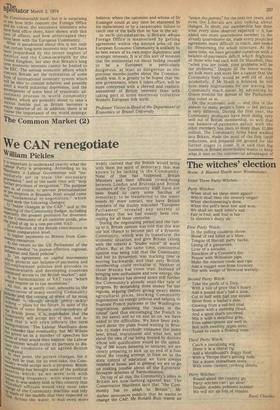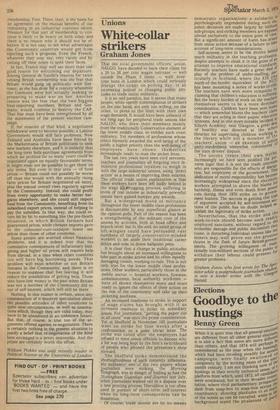We CAN renegotiate lt is important to understand exactly what
the -110our Party is proposing. According to its anifesto, a Labour Government will "immediately set in train the necessary ricedures," and at the same time will "stop hurther processes of integration." The purpose orere is, of course, to prevent procrastination he Pre-emption in Brussels. Next would come "fundamental re-negotiation," which "uld seek the following changes: fi l) "major changes in the CAP," and in the estricirig of the Community budget, including t'cially the present provision for diversion
o the Community of all customs yields, plus
the of up to a one-per-cent VAT: 4) a reduction of the British contribution to fairer comparative level; _3) higher payments to Britain from Cornresources; 4) the return to the UK Parliament of the Powers needed "to pursue effective regional, 'llistrial and fiscal policies";
°) ch an agreement on capital movements whi
Nu protects our balance-of-payments and co,,:eroPloyment policies and provides to onwealth and developing countries ontiriued access to the British market"; and w6) no harmonisation of VAT rates "which Mild require us to tax necessities." reAll that, as is surely clear, amounts to the pon.unciation of many existing Community eihearciisehsedand the vetoing of some of its most
o — though already pretty sicklyplans for the future. In spite of the
til3.1:"°os of some Brussels correspondents of c British press, it is improbable that the a,i:)rrtoll-inity will accept any of that, and in ,r;ed that it will even tolerate the term ownegotiation.' The Labour Manifesto does h,` consider that eventuality, but Mr Wilson vi's given us in a number of speeches his e q0,Ws of what would then happen: the Labour , co;eroment would invite its partners to diss the conditions of an agreed British lAtildrawal. to*a`t that point, the picture changes, for it NY Well be that, for its own sake, the CornWould accept such a proposal. British L ernbe h rs ip has brought none of the political 1ts which, as we were told with . foljr;eatirig frequency, were expected to Wil'!W. It was widely held in this country that chaltehall officials would very soon take up :ge of the Community machine and tidy firi-ci'nch of the muddle that they expected to Across the water, it was even more
widely claimed that the British would bring with them the spirit of democracy that was known to be lacking in the Community. None of that has happened. British Ministers and their officials to-and-froing between London and Brussels)and British members of the Community staff have not been found to carry some bacillus of democracy, to be transferred to the lesser breeds by mere contact, nor have British members of the doubly miscalled "European Parliament" revealed any secrets of democracy that we had meanly been concealing for all these centuries. During the negotiating period and the runup to it, British opinion was told that this was our last chance to become part of a dynamic Community, which was to transform the economic situation, and give Britain (along with the others) a "louder voice" in world affairs. But at the same time, continental opinion was being told that the Community had lost its dynamism, was marking time or moving backwards, and that only British membership could revitalise it. Neither of these dreams has come true. Instead of bringing new enthusiasm and new energy, the British presence has slowed down still further the Community's already snail-like rate of progress. By demanding more money for our regions, arguing (before giving away) about agricultural prices, blocking Community negotiations on energy policies and helping to frustrate French purposes in the Washington negotiations, poisoning the 'snake in the tunnel' (and thus encouraging the French to do the same) and so on and so on, we have added to the difficulties. We have been awkward about the plans found waiting in Brussels to make everybody consume the same beer, bread, mayonnaise and what not, and about the idea of our being treated by doctors whose sole qualification would be the spending of 560 hours listening to lectures; we are clearly preparing to kick up no end of a fuss about the coming attempt to foist on us the state control of education we have always resisted at home, and in general we are to go on making trouble about all the Eurocrats' favourite schemes of 'harmonisation.' On top of all this, the Community's allies in Britain are now turning against her. The Conservative Manifesto says that "the Community has to adapt to Britain"; Mr Barber announces publicly that he wants to change the CAP; Mr Ronald Butt wants an
"union des patries" for the next ten years, and even the Liberals are also talking about changes. In short, our membership has done what every sane observer expected — it has added one more quarrelsome member to the already quarrelsome six, made every projected agreement more difficult to reach, and ended by threatening the whole structure. At the same time, we have provided ourselves with a balance-of-payments deficit which frightens all those who had said, with Dr Mansholt, that "when you are inside, your problems will be our problems." Despite all the brave words, we look more and more like a cancer that the Community body would be well rid of. And incidentally, if Mr Heath is defeated, he will have made negotiations for our leaving the Community much easier, by advancing by fifteen months the demise of the Parliament that voted us in.
On the economic side — and this is the answer to many people's fears — the picture is very different. During the first year, the Community producers have been doing very well out of British membership, so well that our balance-of-payments deficit with the other members has risen to more than £1,000 million. The Community firms have walked into Britain, made the most of the first tariff reductions, and prepared the ground for the further stages to come. It is said that big business in Britain nevertheless wants to keep what it sees as the commercial advantages of
membership. Fine. There, then, is the basis for an agreement on the mutual benefits of our remaining in an industrial customs union. Pressure for that part of membership to continue is likely to be heavy on both sides, and there is no reason why it should not be effective. It is not easy to see what advantages the Community countries would get from rejecting such a proposal. Even the French, whatever they may say, very rarely end by cutting off their noses to spite their faces.
In fact, France may well see more than one good reason for welcoming our departure. Among General de Gaulle's reasons for twice vetoing British membership was the fear that Britain would gang up politically with Germany, as she has done for a century whenever the Germans were not actually making or preparing to make war on her. Another reason was the fear that the two biggest food-importing members, Britain and Germany, would combine to 'destroy the CAP. That fear must have been strengthened by all the statements of the present election campaign.
If, for reasons of that kind, a negotiated withdrawal were to become possible, a Labour Government would still face problems. New Zealand and Australia have been forced by the Marketmania of British politicians to seek new markets elsewhere, and it is unlikely that the long-term bulk-purchase agreements from which we profited for so many years could be negotiated again on equally favourable terms. It might even not be possible to get them on any terms. But even in this area — of food prices — Britain could not possibly be worse off than she would with the annually rising farm prices for Britain negotiated on entry, plus the annual overall rises regularly agreed by the Community. Instead, she could profit from every opportunity to make better bargains elsewhere, and she could still import food from the Community, benefiting from its subsidised export prices, instead of helping to pay the subsidies. In that way, she could return bit by bit to something like the pre-Heath situation, in which British farmers had guaranteed prices, while cheaper imports gave to the consumer-cum-taxpayer lower net prices than those of other countries. Some people are worried about financial problems, and it is indeed true that the cumulative consequences of inflationary budgeting and higher oil prices will require help from abroad, at a time when other countries too will have big borrowing needs. That problem will exist whether or not Britain remains in the Community, and there is no reason to suppose that her leaving it will reduce the possibilities of getting help. Those who have lent money in the past when Britian was not a member of the Community did so out of self-interest, which will still be there.
Nothing in this matter is certain, since any consideration of it involves speculation about the possible attitudes of other countries in quite new circumstances, as well as assumptions which, though they are valid today, may have to be abandoned in an unknown future. But that, of course, is true too of the arguments offered against re-negotiation. There is certainly nothing in the present situation to justify a belief that re-negotiation of the kind here envisaged is a priori impossible. And the prizes are certainly worth the effort.

































 Previous page
Previous page